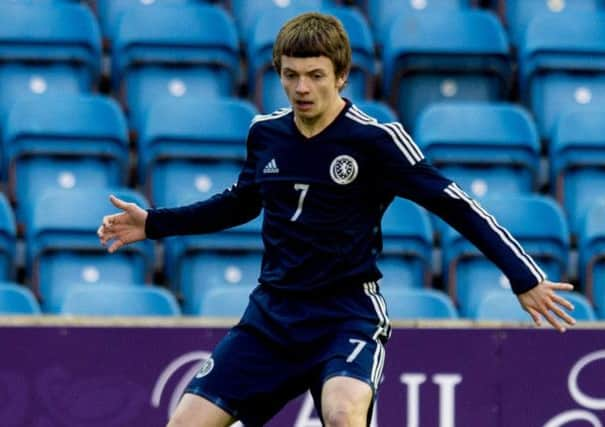The rising stars of Scottish football


Meanwhile, those in the know say the crop who are three years younger and are the first intake at the seven performance schools scattered around the county are exhibiting standards previously not witnessed at their age group because of the three hours of daily tuition the set-up is providing them.
In the Under-17 European Championship finals in Malta in the next couple of weeks, if the young Scots demonstrate the quiet assurance and determination of their coach Scot Gemmill, then their group of Portugal, Germany and Switzerland may not prove as onerous as it appears on paper.
Advertisement
Hide AdAdvertisement
Hide AdGemmill, who has taken over from Scott Booth and will be out on his own for the first time in the white heat of competition after being mentored by performance director Mark Wotte for last month’s elite qualifying round, is sure his team will. He watched them doing so to overcome such fancied sides as Belgium and Bosnia-Herzegovina. These efforts qualified them for an eight-team finals that Spain, France and Italy all failed to make.
Gemmill, 43, who earned 26 full Scotland caps in a career spent principally with Nottingham Forest and Everton, shares the understated conviction of his old man, Archie, and seems able to impart this to his team. The Scotland coach speaks of a psyche within his team that both avoids the bashful and boastful that have undone international teams of the past.
“What I like about the group is that they haven’t got any false perceptions of their level,” Gemmill says. “They understand we have qualified for the reasons we have qualified. The defensive nature and solidity of the team, also the motivational part, and the intensity of the way we play. When I spoke to them before the elite round I thought my job was to motivate, almost just to get them to realise what an opportunity they had and what it would take to achieve that. I am delighted with the way they bought into that.
“They know we didn’t qualify because we played tiki-taka football, they know we qualified through – this is a little bit cheeky – wanting it more than the opposition. In our team meetings I say it is easy for me to say that we want it more than the opposition, because in their team meeting I bet they are saying the same thing. It has to be visible in the performance. The neutral who comes to watch our game has to say ‘yeah that team wanted it more’. I think our team realise that.”
Gemmill considers it not unreasonable to think his team could emerge from their group, which begins for them against Portugal on Friday afternoon. They have, he says, met every challenge they have faced in the past 18 months, coming through two rounds of qualifiers by being “switched on” and executing the necessary game plan with “intelligence”.
“These guys honestly are not afraid of anyone, but that is because they have experience of playing in really important games, and playing against good players. When we meet up, they are full of questions. They want to know who they are playing against, and we help them with it. We prepare them and they really have shown the interest, they are not young lads who just expect to turn up and play. They want to prepare, and realise the importance of the preparation. I have watched Portugal and there is no doubt they are a very good team. We have to find a way and I am confident our players will understand that everyone needs to know how we beat them. We can’t just turn up and play them.”
A mark of Gemmill is that, before he embarks on chat about the Maltese finals when sitting down in front of the assembled press pack, he asks if he can make a declaration. “I definitely want to say straight away that Scott Booth worked really hard with the team. I was with Scott, as you know, and got lucky to get an opportunity with Mark before the elite round. Straight off the top of the bat I want to mention the work Scott’s done, and how well he’s done, and he’s obviously put the squad together, so he deserves a lot of credit.”
Gemmill, who was with the performance school under-14s in Eindhoven last week, where they played Holland and Czech Republic on two consecutive days, and registered a loss and a draw against the hosts and a win and a defeat against the Czechs, reveals he has modern plans for his finals squad that he considers a rare blend for one hailing from this nation.
Advertisement
Hide AdAdvertisement
Hide AdAlthough denied Kilmarnock’s first-team squad member Greg Kiltie through injury, he still has the both Dundee’s Craig Wighton and Rangers’ Ryan Hardie to pick from for the central striker role in the Malta.
“I think it is unusual for a Scotland team or squad to have that choice of striker, and also I think it is really important you have an ace card to play, and you see that in a lot of the top, top teams they have an ace card to play,” he says.
“It is not just in the case of Hardie that we have strength within the squad, and versatility and options, it is not just about the best 11. The options give me, and everyone, great confidence. I have spoken to a couple of people recently and though it is tempting to play everybody, if you see most coaches, they tend to keep something to see how the game progresses and make sure they have a Plan B and the option to try and find another way to win.”
For a Scotland so starved of finding the right formula at finals, any way will do.